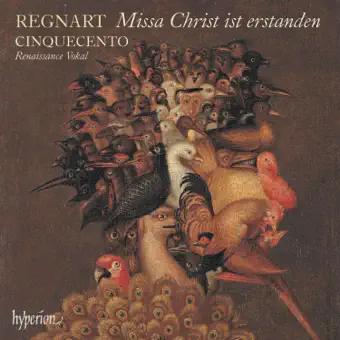Awards Issue 2021
Regnart: Missa Christ ist erstanden & Other Works
Cinquecento
Cinquecento’s terugkeer naar de muziek van de 16e-eeuwse componist Jacob Regnart vindt dat het ensemble – regelmatige bezoekers van de Editor’s Choice-pagina – in onberispelijke vorm verkeert. Opnieuw een triomfantelijk album.

Regelmatige lezers weten dat ik Cinquecento bijzonder hoog acht, dus het zal geen verrassing zijn als ik begin met te zeggen dat dit nieuwe album, hun derde met werken van Jacob Regnart (ca1540/45-1599), hun buitengewoon hoge kwaliteit van zowel uitvoering als programma behoudt. De beroemdste van de vijf muzikale broers, Jacob (Jacques) Regnart, was een van de verschillende Nederlanders die een functie bekleedden aan het Duitse Habsburgse hof, en zijn muziek doet me soms denken aan de sonore contrapuntische dichtheid van Gombert (ca1495-ca1560); maar, zoals Stephen Rice aangeeft, kan een veel nauwere vergelijking worden gemaakt met Lassus (ca1530/32-1594), zowel in termen van helderheid van textuur als met name als je de variëteit en de enorme hoeveelheid output in ogenschouw neemt.
Dit nieuwe album opent met de opzwepende Duitse paashymne Christ ist erstanden (‘Christus is opgestaan’), die bronmateriaal wordt voor de Missa Christ ist erstanden met zijn zelfverzekerde, goed uitgebalanceerde Kyrie, die de openingshymne op ingenieuze wijze vouwt in een imiterende textuur. Cinquecento zit duidelijk in hun comfortzone en vindt meteen een sweet spot voor optimaal polyfonisch momentum dat de frases ook ruimte geeft om uit te breiden. De balans is wonderbaarlijk helder. Regnarts sneller bewegende Gloria en Credo secties zijn veel gevarieerder en Cinquecento’s ritmische precisie brengt veel verrukkelijke bewegingen naar voren, waaronder een passend grimmige sfeer in de ‘Crucifixus’.
Missa Freu dich, du werthe Christenheit (‘Verheug u, o waardige Christendom’) biedt een betoverend melodieuze textuur die de langere zinnen van zijn model weerspiegelt. De zachte ontvouwing van de imiterende Kyrie-zinnen is magisch op deze opname; en luister vooral naar een vrolijk countertenormoment in het Gloria bij ‘qui sedes ad dexteram Patris’ (‘die zit aan de rechterhand van de Vader’) – het heet niet voor niets Ars Perfecta.

Regular readers will know that I hold Cinquecento in especially high regard so it will come as no surprise if I open by saying that this new album, their third to feature works by Jacob Regnart (c1540/45-1599), maintains their exquisitely high quality of both performance and progamme. The most famous of five musical brothers, Jacob (Jacques) Regnart was one of several Netherlanders to hold posts at the German Habsburg court, and his music at times reminds me of the sonorous contrapuntal density of Gombert (c1495-c1560); but, as Stephen Rice points out, a much closer comparison can be made with Lassus (c1530/32-1594), both in terms of clarity of texture and especially when considering the variety and sheer quantity of output.
This new album opens with the rousing German Easter hymn tune Christ ist erstanden (‘Christ is risen’), which becomes source material for the Missa Christ ist erstanden with its confident, well-balanced Kyrie, which ingeniously folds the opening hymn phrase into an imitative texture. Cinquecento are clearly in their comfort zone and immediately find a sweet spot for optimal polyphonic momentum that also allows the phrases room to expand. The balance is wonderfully clear. Regnart’s faster-moving Gloria and Credo sections are much more varied and Cinquecento’s rhythmic precision brings out many delightful movements, including an appropriately stark atmosphere in the ‘Crucifixus’.
Missa Freu dich, du werthe Christenheit (‘Rejoice, O worthy Christendom’) offers a more bewitchingly tuneful texture reflecting the longer phrases of its model. The gentle unfurling of the imitative Kyrie phrases is magical on this recording; and listen out especially for a joyful countertenor moment in the Gloria at ‘qui sedes ad dexteram Patris’ (‘who sits at the right hand of the Father’) – it’s not called Ars Perfecta for nothing.
